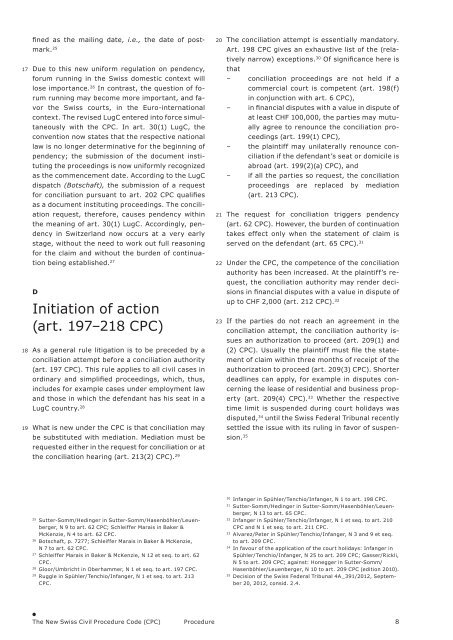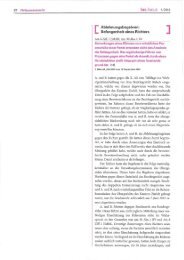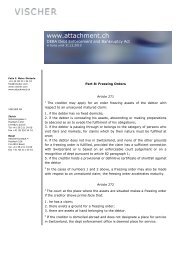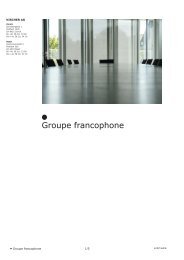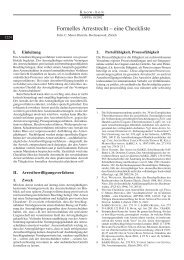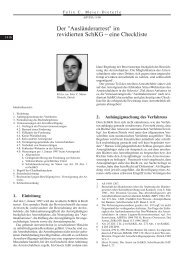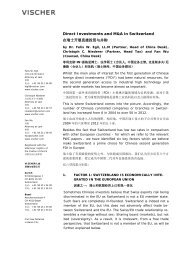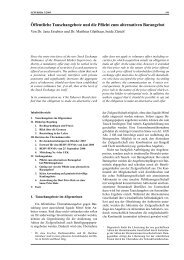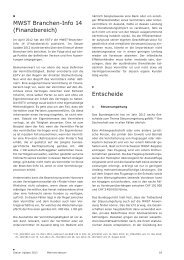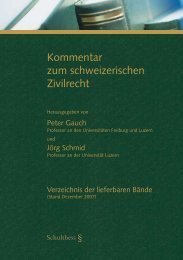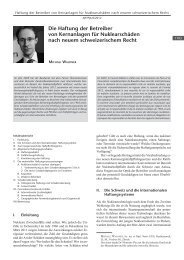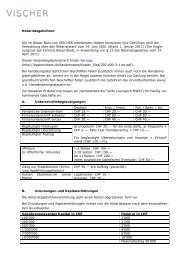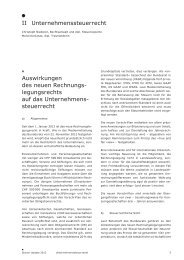The New Swiss Civil Procedure Code (CPC) - Vischer
The New Swiss Civil Procedure Code (CPC) - Vischer
The New Swiss Civil Procedure Code (CPC) - Vischer
Create successful ePaper yourself
Turn your PDF publications into a flip-book with our unique Google optimized e-Paper software.
fined as the mailing date, i.e., the date of post-<br />
mark. 25<br />
17 Due to this new uniform regulation on pendency,<br />
forum running in the <strong>Swiss</strong> domes tic context will<br />
lose importance. 26 In contrast, the question of fo-<br />
rum running may become more important, and fa-<br />
vor the <strong>Swiss</strong> courts, in the Euro-international<br />
context. <strong>The</strong> revised LugC entered into force simul-<br />
taneously with the <strong>CPC</strong>. In art. 30(1) LugC, the<br />
convention now states that the respective national<br />
law is no longer determinative for the beginning of<br />
pendency; the submission of the document insti-<br />
tuting the pro ceedings is now uniformly recognized<br />
as the commencement date. According to the LugC<br />
dispatch (Botschaft), the submission of a request<br />
for conciliation pursuant to art. 202 <strong>CPC</strong> qualifies<br />
as a document instituting proceedings. <strong>The</strong> concili-<br />
ation request, there fore, causes pendency within<br />
the meaning of art. 30(1) LugC. Accordingly, pen-<br />
dency in Switzerland now occurs at a very early<br />
stage, without the need to work out full reasoning<br />
for the claim and without the burden of continua-<br />
tion being established. 27<br />
D<br />
Initiation of action<br />
(art. 197–218 <strong>CPC</strong>)<br />
18 As a general rule litigation is to be preceded by a<br />
conciliation attempt before a concilia tion authority<br />
(art. 197 <strong>CPC</strong>). This rule applies to all civil cases in<br />
ordinary and simplified proceedings, which, thus,<br />
includes for example cases under employ ment law<br />
and those in which the defendant has his seat in a<br />
LugC country. 28<br />
19 What is new under the <strong>CPC</strong> is that conciliation may<br />
be substituted with mediation. Media tion must be<br />
requested either in the request for conciliation or at<br />
the concilia tion hearing (art. 213(2) <strong>CPC</strong>). 29<br />
25 Sutter-Somm/Hedinger in Sutter-Somm/Hasenböhler/Leuenberger,<br />
N 9 to art. 62 <strong>CPC</strong>; Schleiffer Marais in Baker &<br />
McKenzie, N 4 to art. 62 <strong>CPC</strong>.<br />
26 Botschaft, p. 7277; Schleiffer Marais in Baker & McKenzie,<br />
N 7 to art. 62 <strong>CPC</strong>.<br />
27 Schleiffer Marais in Baker & McKenzie, N 12 et seq. to art. 62<br />
<strong>CPC</strong>.<br />
28 Gloor/Umbricht in Oberhammer, N 1 et seq. to art. 197 <strong>CPC</strong>.<br />
29 Ruggle in Spühler/Tenchio/Infanger, N 1 et seq. to art. 213<br />
<strong>CPC</strong>.<br />
<br />
<strong>The</strong> <strong>New</strong> <strong>Swiss</strong> <strong>Civil</strong> <strong>Procedure</strong> <strong>Code</strong> (<strong>CPC</strong>) <strong>Procedure</strong><br />
20 <strong>The</strong> conciliation attempt is essentially mandatory.<br />
Art. 198 <strong>CPC</strong> gives an exhaustive list of the (rela-<br />
tively narrow) exceptions. 30 Of significance here is<br />
that<br />
– conciliation proceedings are not held if a<br />
commercial court is competent (art. 198(f)<br />
in conjunction with art. 6 <strong>CPC</strong>),<br />
– in financial disputes with a value in dispute of<br />
at least CHF 100,000, the parties may mutu-<br />
ally agree to renounce the conciliation pro-<br />
ceedings (art. 199(1) <strong>CPC</strong>),<br />
– the plaintiff may unilaterally renounce con-<br />
ciliation if the defendant’s seat or domicile is<br />
abroad (art. 199(2)(a) <strong>CPC</strong>), and<br />
– if all the parties so request, the conciliation<br />
proceedings are replaced by media tion<br />
(art. 213 <strong>CPC</strong>).<br />
21 <strong>The</strong> request for conciliation triggers pendency<br />
(art. 62 <strong>CPC</strong>). However, the burden of continuation<br />
takes effect only when the statement of claim is<br />
served on the defend ant (art. 65 <strong>CPC</strong>). 31<br />
22 Under the <strong>CPC</strong>, the competence of the conciliation<br />
authority has been increased. At the plaintiff’s re-<br />
quest, the conciliation authority may render deci-<br />
sions in financial dis putes with a value in dispute of<br />
up to CHF 2,000 (art. 212 <strong>CPC</strong>). 32<br />
23 If the parties do not reach an agreement in the<br />
conciliation attempt, the conciliation authority is-<br />
sues an authorization to proceed (art. 209(1) and<br />
(2) <strong>CPC</strong>). Usually the plaintiff must file the state-<br />
ment of claim within three months of receipt of the<br />
authorization to proceed (art. 209(3) <strong>CPC</strong>). Shorter<br />
deadlines can apply, for example in disputes con-<br />
cerning the lease of residential and business prop-<br />
erty (art. 209(4) <strong>CPC</strong>). 33 Whether the respective<br />
time limit is suspended during court holi days was<br />
disputed, 34 until the <strong>Swiss</strong> Federal Tribunal recently<br />
settled the issue with its ruling in favor of suspen-<br />
sion. 35<br />
30 Infanger in Spühler/Tenchio/Infanger, N 1 to art. 198 <strong>CPC</strong>.<br />
31 Sutter-Somm/Hedinger in Sutter-Somm/Hasenböhler/Leuen-<br />
berger, N 13 to art. 65 <strong>CPC</strong>.<br />
32 Infanger in Spühler/Tenchio/Infanger, N 1 et seq. to art. 210<br />
<strong>CPC</strong> and N 1 et seq. to art. 211 <strong>CPC</strong>.<br />
33 Alvarez/Peter in Spühler/Tenchio/Infanger, N 3 and 9 et seq.<br />
to art. 209 <strong>CPC</strong>.<br />
34 In favour of the application of the court holidays: Infanger in<br />
Spühler/Tenchio/Infanger, N 25 to art. 209 <strong>CPC</strong>; Gasser/Rickli,<br />
N 5 to art. 209 <strong>CPC</strong>; against: Honegger in Sutter-Somm/<br />
Hasenböhler/Leuenberger, N 10 to art. 209 <strong>CPC</strong> (edition 2010).<br />
35 Decision of the <strong>Swiss</strong> Federal Tribunal 4A_391/2012, Septem-<br />
ber 20, 2012, consid. 2.4.<br />
8


